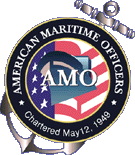 Section Front Front Page |
 | |
|
| |
|
 |
| By MICHAEL R. McKAY | |
| By any
measure, the Maritime Security Program is a good deal. The MSP
sustains peacetime jobs for civilian U.S. merchant marine officers
and crews on 47 U.S.-flag ships (including seven operated under AMO
contract) and it keeps those ships working in commercial foreign
trade. More importantly, the Maritime Security Program provides the Department of Defense with a core fleet of cargo ships that can supplement government-owned or chartered sealift ships in national security emergencies. It also guarantees DOD the use of worldwide intermodal and logistics support systems, everything from land transportation to cargo terminals to computer networks. These economic and defense dividends accrue from a modest fixed federal investment of just under $100 million a year, a fraction of what it would cost the government to build, buy, operate and maintain comparable tonnage and support systems. But there is one problem. The MSP, authorized in the Maritime Security Act of 1996 and overseen by the Maritime Administration in the Department of Transportation, will expire in September 2005. If the program is not reauthorized, the U.S. is certain to lose the 47 ships now enrolled in the MSP, and more could follow. The jobs these ships account for at sea and ashore will be lost. With that in mind, the principal maritime unions (the Seafarers, AMO, the MM&P and the MEBA) and major U.S.-flag ship operators have heeded Maritime Administrator William Schubert's call for early consensus on MSP renewal. We have agreed on practical ways to make the Maritime Security Program even more effective. The union-employer legislative proposal was presented to the House Armed Services Committee's Special Oversight Panel on the Merchant Marine on July 16. The proposal is covered in detail elsewhere in this issue, but its recommendations are:
Despite such benefits, there is resistance to the proposal, much of it arising around the issue of vessel ownership and the participation of companies that are structurally linked to foreign firms. One unfounded fear is that equating traditional U.S.-flag shipping companies with lines tied to foreign interests in the Maritime Security Program would eventually compromise the meaning of the phrase "U.S. ownership" as it applies in other trades--specifically, domestic deep-sea, Great Lakes and inland waters cargo markets governed by the Jones Act of 1920. The Jones Act reserves all waterborne U.S. point-to-point cargo shipping for vessels owned, built, flagged and manned in the U.S. Another is that, under the Maritime Security Program reauthorization proposal, foreign companies would have too much control over U.S. defense sealift. The argument is that political or diplomatic considerations could conceivably cause foreign companies to bar MSP ships from military support service in a crisis. These concerns will be addressed by AMO and others once all interested parties (including MARAD and DOD) have weighed in. We in AMO see no merit in such arguments, and we are prepared to challenge them. But the discussion is open, and it will continue for some time. For now, it is important for everyone to understand that, without a renewed MSP, there soon will be no more U.S.-flag merchant fleet in international trade. | |
| Front Page | |